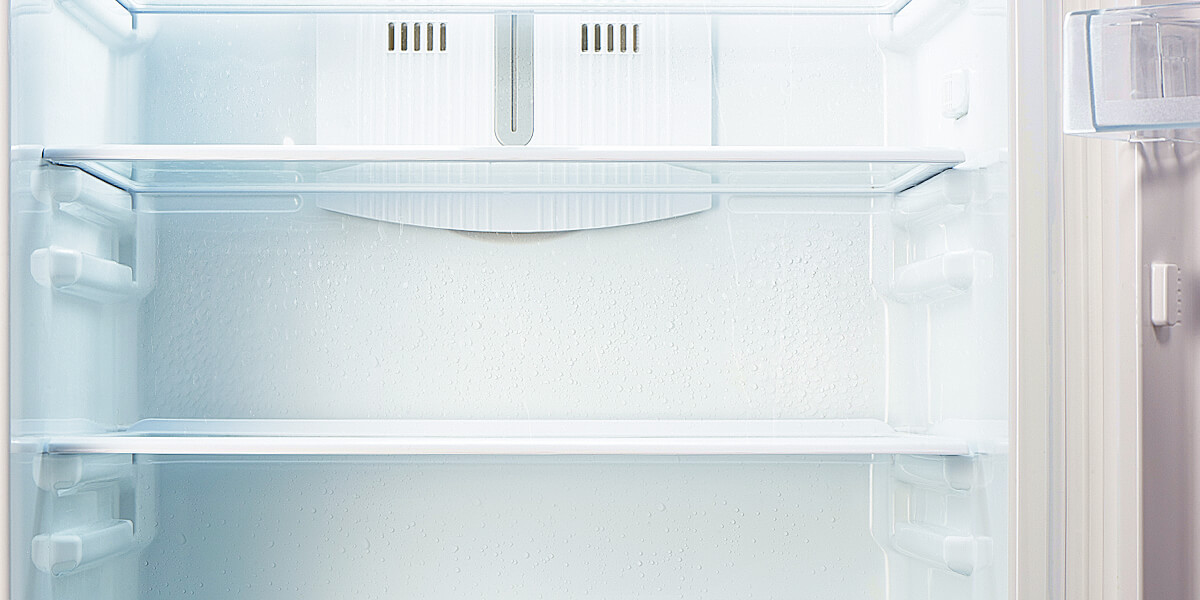Your freezer is wet inside due to condensation or a blocked defrost drain. These issues lead to water buildup.
A wet freezer can be frustrating and concerning. Excess moisture usually results from condensation, which occurs when warm air enters the freezer. This can happen if the door is frequently opened or not sealed properly. Another common cause is a blocked defrost drain, which prevents water from draining away during the defrost cycle.
Both of these issues need to be addressed promptly to prevent food spoilage and maintain the efficiency of your freezer. Regular maintenance and checking seals can help keep your freezer dry and functioning optimally.

Credit: www.inductiveintelligence.com
Common Causes Of A Wet Freezer
Warm air enters the freezer and meets cold air. This causes condensation. Moisture turns into water droplets inside the freezer. Frequent door openings can make it worse. Keep the door closed as much as possible.
Broken door seals let warm air into the freezer. This warm air causes condensation. Check the seals for cracks or gaps. Replace the seals if they are damaged. This helps keep the freezer dry.
The defrost drain removes water from the freezer. A blocked drain causes water to collect inside. Clear the drain to fix the problem. Use warm water or a soft brush to clean the drain. This helps the freezer stay dry.
Condensation Problems
Moisture buildup inside your freezer often results from improper sealing or frequent door openings. Faulty door gaskets or high humidity levels can also contribute to condensation. Regularly checking and maintaining the seal can help prevent a wet interior.
Temperature Fluctuations
Freezers work best at a constant temperature. Fluctuations can cause condensation. Condensation forms when cold air meets warm air. This can make the inside of your freezer wet. Keep your freezer at a steady temperature.
Humidity Levels
High humidity can cause your freezer to become wet inside. Moist air gets trapped inside the freezer. This moisture turns into water droplets. Keep the room where the freezer is located dry.
Frequent Door Openings
Opening the freezer door often lets in warm air. This warm air causes condensation. Try to open the door only when needed. Frequent door openings can make the freezer wet inside.
Inspecting The Door Seals
Check the door seals for any cracks or tears. A damaged seal can let warm air inside. This causes condensation and makes the freezer wet. Make sure the seal is clean and smooth.
Use a cloth to clean the seals. Dirt or food particles can weaken the seal. A weak seal lets moisture in. Clean seals help keep the freezer dry.
Replace seals that are damaged. New seals stop warm air from entering. This prevents moisture buildup. Always buy the right size for your freezer.

Credit: www.reddit.com
Clearing A Blocked Defrost Drain
The defrost drain is usually located at the back. It helps remove excess water. If blocked, water cannot escape. This causes a wet freezer. Look for a small hole or tube. Ensure it is not covered.
First, unplug the freezer. Use a turkey baster to flush the drain. Warm water works best. A pipe cleaner can help remove debris. For stubborn clogs, try a mixture of baking soda and water. Let it sit for a few minutes. Rinse with warm water again.
Regular cleaning keeps the drain clear. Check it every few months. Avoid overloading your freezer. This allows air to circulate. Ensure food is properly sealed. This prevents spills and blockages. Regularly check for ice build-up. Remove it to keep the drain clear.
Temperature Settings
Improper temperature settings cause frost buildup and moisture accumulation inside your freezer. Adjusting the thermostat can resolve this issue efficiently.
Optimal Freezer Temperature
The ideal temperature for a freezer is 0 degrees Fahrenheit (-18 degrees Celsius). At this temperature, food stays frozen and moisture levels remain low. Too high or too low can cause moisture.
Adjusting The Thermostat
Check the thermostat settings regularly. Ensure it is set to the correct temperature. An incorrect setting can lead to frost build-up and excess moisture.
Impact On Moisture
Proper temperature control helps reduce moisture inside the freezer. Excessive moisture can cause ice formation and make the freezer wet inside. Maintaining the right temperature is crucial.
Proper Storage Practices
Keep similar items together in the freezer. Use labels to identify food quickly. This helps you find things fast. You spend less time with the door open. Less air gets inside, keeping the freezer dry.
Store food in airtight containers. This prevents moisture from escaping. Use freezer bags for smaller items. Good containers keep the air out. This helps keep the inside dry.
Do not pack the freezer too full. Leave space between items. Air needs to circulate. Good airflow keeps the freezer dry. Overloading blocks air and causes moisture.
Regular Maintenance Tips
Keep your freezer clean to avoid moisture buildup. Wipe the inside every month. Use a mild detergent and a damp cloth for cleaning. Dry the surfaces completely to prevent ice.
Inspect the door seals for cracks or gaps. Replace damaged seals to keep the cold air inside. Check the drainage holes for blockages. Clear any blockages to ensure proper drainage.
Hire a professional for a yearly inspection. They can spot issues you might miss. A professional can check the cooling system and repair any problems. This keeps your freezer running efficiently.
When To Call A Professional
Persistent moisture inside your freezer often indicates a problem. A professional can diagnose issues like faulty seals or defrost system failures. Seek expert help to prevent further damage and ensure optimal performance.
Persistent Issues
Water inside the freezer can mean trouble. If the problem keeps happening, it’s best to call a professional. They can find the root cause and fix it. Ignoring it might damage your food and freezer.
Complex Repairs
Some repairs need special tools and skills. If you try to fix it yourself, you might make it worse. A professional can handle complex repairs safely. This ensures your freezer works well for a long time.
Warranty Considerations
Check if your freezer is still under warranty. Fixing it yourself might void the warranty. Professional help can keep your warranty valid. This can save you money in the long run.

Credit: www.solarappliance.net
Frequently Asked Questions
How Do I Stop Condensation In My Freezer?
To stop condensation in your freezer, check the door seal, avoid overloading, and ensure proper ventilation. Regularly defrost and clean the freezer.
Why Is My Fridge Freezer Wet Inside?
Your fridge freezer might be wet inside due to blocked defrost drain, faulty door seals, or high humidity. Check and clean the defrost drain, ensure door seals are tight, and reduce humidity. Regular maintenance can prevent moisture buildup.
Why Does My Freezer Feel Wet?
Your freezer feels wet due to condensation. Warm air entering can cause moisture buildup. Ensure the door seals properly.
How Do You Know If Your Freezer Is Going Bad?
A failing freezer shows fluctuating temperatures, excessive frost, unusual noises, spoiled food, or a constantly running motor.
Conclusion
A wet freezer can lead to bigger problems if not addressed. Check for common issues like door seals and defrost cycles. Regular maintenance keeps your freezer efficient and dry. Understanding the causes helps you prevent future moisture buildup. Keep your freezer in top shape for optimal performance and food safety.
